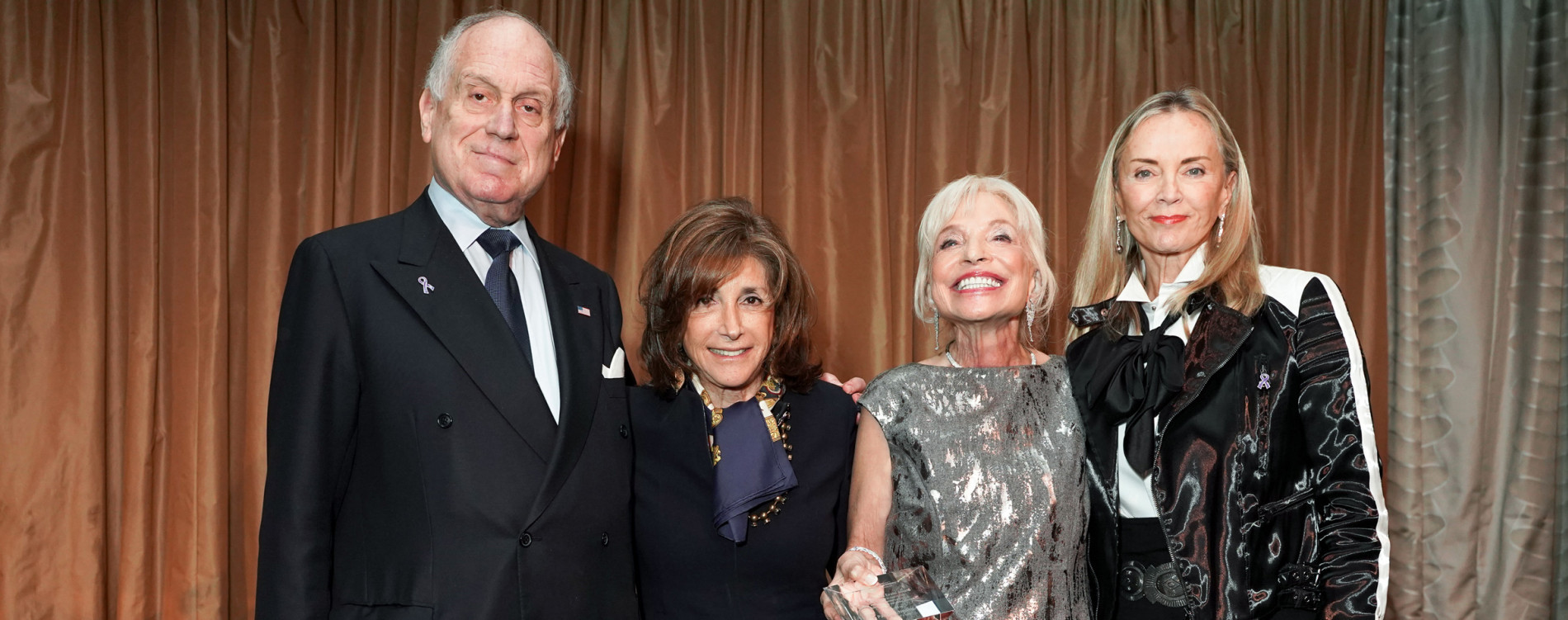By any definition, Pamela J. Newman, Ph.D. and her late husband Henry (Hank) Kates were a power couple. Dr. Newman enjoyed an illustrious career as one of the top producers in the international insurance business starting at Marsh & McLennan before moving on to Aon PLC. Today she is President and CEO of PJN Strategies LLC, a boutique strategic consulting firm. She is an author, lecturer, member of the Council of Foreign Relations, and has held positions on numerous for-profit and non-profit corporate boards. Mr. Kates also held notable positions in the insurance industry, rising to CEO of Mutual Benefit. He served on many corporate boards and was a patron of the arts.
But when Alzheimer’s struck Hank, suddenly the Newman-Kates family felt powerless. Together, they valiantly fought the disease until Hank’s death in 2016 at age 77.
For years, Dr. Newman has been an ardent supporter of Alzheimer’s research and ADDF, serving on the Board of Overseers since 2013. In recognition of her dedication, we recently honored Pamela with the Charles Evans Award at the Tenth Annual “Hope on the Horizon” Fall Symposium & Luncheon in New York City. “Pamela truly embodies the altruistic essence of this award,” said Ronald Lauder, ADDF co-chairman and co-founder. “Like Charles Evans, who this award is named in memory of, Pamela’s determination, advocacy and enthusiasm derive from her personal connection to the disease.”
Upon accepting her award, Pamela expressed heartfelt gratitude to ADDF for its efforts to conquer Alzheimer’s disease as she shared her personal experiences. Her journey took her from frustration to revelation, and now to hope for the future. Here is an edited version of her remarks.
Thank you: Leonard and Ronald Lauder.
Thank you for not accepting the premise that aging and mind deterioration are inevitable.
The Alzheimer’s Drug Discovery Foundation enables us to have hope.
Thank you: Howard Fillit.
Thank you for being Hank’s doctor which inevitably meant you were my doctor. We fought often, as you guided me on what seemed impossible: letting go.
I support your vision and inexhaustible effort to find drugs to cure or allay Alzheimer’s.
Since the cost of Alzheimer’s disease today for the United States (exclusive of caregiving) is $288 billion dollars.
This effort is a must priority.
Hope.
Thank you to everyone sitting here today:
Would you mind taking a moment to stand up and shake each other’s hands at each table to congratulate yourselves on raising $1.2 million for 100% application to medical research for the Alzheimer’s Drug Discovery Foundation.
Hope.
Like many of you here today, the “war” on Alzheimer’s disease is a war I have fought in. The war on Alzheimer’s meant many things to me. I watched an otherwise fine driver plow into a garden hedge while driving 5 miles per hour. I came home from work to find the RN caregiver I had hired and my husband in each other’s arms. I lost my husband while shopping, at dinner parties, while taking a walk with him in Nantucket.
My husband, a CEO of a life insurance company, real estate developer, art collector, underwriter of the Phantom of the Opera and Les Miserables was both ill enough to have to attend an adult daycare center and well enough to beg me not to send him there.
I learned from a friend that I looked forlorn, weakened, sad, and exhausted and probably needed help from a psychiatrist. While I had never been to a psychiatrist, I went to see Larry’s psychiatrist. While I saw him only once, it was indeed remarkably helpful.
I was skeptical about the psychiatrist when we first met. He didn’t seem to get the conundrum I’d expressed to him that I both wanted this man I desperately loved to live and not to live. I resented the expense of his bill until he stood up and shouted at me “Pamela, your husband is dead!”
Had he not heard me? Did he not understand the predicament of Hank being here, but not being here? Suddenly I got it! I understood the psychiatrist’s point: Hank, as I knew him, had already died.
Oddly, when Hank was on his deathbed, he became, I thought, remarkably coherent. I asked him in those last few moments as I always had “who loved him more than life itself?” His classic cryptic humor responded: “Chairman Mao, our dog.”
Thank you, everyone here, on behalf of your mom, your dad, your grandparent, your sister, your brother, your in-law and yourself.
Thank you for recognizing we are fighting a disease that will affect one out of two people who are in their eighties. Thank you for fighting a disease that people fear getting more than the fear of public speaking or the fear of flying in airplanes.
Thank you for caring about stopping a disease that occurs around the world.
Hope.
